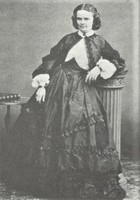Harriet Hosmer's "The Doleful Ditty of the Roman Caffe Greco"
Dublin Core
Title
Harriet Hosmer's "The Doleful Ditty of the Roman Caffe Greco"
Subject
Frustration
Gender Norms
Italy--Rome
Hosmer, Harriet Goodhue, 1830-1908
Description
Hosmer writes a "witty" poem, as Cornelia Carr describes it in her edition of Hosmer's letters, about the patriarchal culture of male sculptors in Rome. The poem is published in the New York Evening Post in the summer of 1864.
Credit
Internet ArchiveCreator
Hosmer, Harriet Goodhue, 1830-1908
Source
Date
1864-00-00
Type
Reference
Poem Item Type Metadata
From
Hosmer, Harriet Goodhue, 1830-1908
Text
'Twas in the Greek Caffe,
Half screened from public eye,
We sat, not many months ago,
Melpomene and I.
We sat, and saw in that long room
Upon the right hand side.
That souls, though made of sternest stuff,
Are sometimes sternly tried.
And in the outer, groups
Of artists sat apart.
And much was said of other things,
Tho' nought was said of art.
But the luckless half-a-dozen
Sat motionless and mute;
Each had his heavy, brooding thought.
And each had his cheroot.
When rose a portly figure,
With beard as black as jet,
In slightly nasal accents said:
" We all know why we've met.
"'Tis time, my friends, we cogitate,
And make some desperate stand.
Or else our sister artists here
Will drive us from the land.
"It does seem hard that we at last
Have rivals in the clay,
When for so many happy years
We had it all our way.
"Those good old times alas! I feel
That I have said enough,
And think, with due respect to art,
I'll take another puff."
Then rose a man of stature small,
The smallest far of them,
And mild and plausible he looked.
And hemmed a little hem.
"No fault of mine, my brothers,
I beg you to recall.
To root this evil from the land,
I've done my little all.
"For many years this question hath
Employed my artist mind;
I moved with caution, and with skill
And strategy combined.
"Nor time, nor patience have I spared.
But this don't seem to do;
Ye all know that, but what is worse,
Our sisters know it too."
He said, and looked the Roman,
Although a trifle small;
Melpomene half whispered he
In some respects was Gaul.
But, Gaul or Roman, loud applause
His observations hailed.
Up rose a third. "We know you tried,
What if we know you failed.?
" We feel full well, my brother,
That truth which none deny;
No race is certain to the swift.
No battle to the sly.
"It is in what we strive to do
Our greatest merit lies
Though scarce a victor, yet in you
Our chief we recognize."
Whereat, o'erspread with modest blush,
The hero rose and smiled,
And sang his little song of thanks,
Still plausible and mild.
Yet, ere the song was fairly sung,
A man of grizzled hue
'Inquired, in somewhat ursine speech,
"Well, what are you going to do?"
Each waited for the other
To speak with vacant stare.
Until the awful pause was broke
By him of silvered hair.
A little fun was in his eye.
And banter in his tone:
"I deal," quoth he,
"my brothers.
In canvas, not in stone.
"In short, I'm not a sculptor ;
So, well do I surmise,
I cannot with you keenly feel
Just where your aching lies.
"We know our loving sisters
Are somewhat in your way;
We know 'tis hard that while you work
That they should 'pat their clay,'
"Yet for your present ills
The remedy I've hit
Is, when you cannot help yourself.
To make the best of it.
"And then, again, my brothers,
One point attention claims,
Is it a very manly thing
To battle with these dames?
"I sometimes think, for when I speak
My mind, I speak it all.
Recalling, too, what others feel,
It does look somewhat small.
"Suppose you try another plan,
More worthy art and you;
Suppose you give them for their works
The credit which is due.
"An honest and a kindly word,
If spoken now and then.
Would prove what seems a doubtful point
You could, at least, be men"
He spoke, and sat; no voice replied,
Each lip confusion locks.
And nought was heard, save distant sounds,
Of "Coffee, two bajocs."
A furtive glance or two were cast
To where the chieftain sat.
He hemmed his hem, and each moustache
Was pulled, this way and that.
"And for that I am woman,"
Melpomene was heard
Soliloquizing, "will I sing
This ditty, word for word."
The clock struck ten ; I minded me
Of friends, at home, to sup;
And when we left, what little mind
They had, was not made up.
Half screened from public eye,
We sat, not many months ago,
Melpomene and I.
We sat, and saw in that long room
Upon the right hand side.
That souls, though made of sternest stuff,
Are sometimes sternly tried.
And in the outer, groups
Of artists sat apart.
And much was said of other things,
Tho' nought was said of art.
But the luckless half-a-dozen
Sat motionless and mute;
Each had his heavy, brooding thought.
And each had his cheroot.
When rose a portly figure,
With beard as black as jet,
In slightly nasal accents said:
" We all know why we've met.
"'Tis time, my friends, we cogitate,
And make some desperate stand.
Or else our sister artists here
Will drive us from the land.
"It does seem hard that we at last
Have rivals in the clay,
When for so many happy years
We had it all our way.
"Those good old times alas! I feel
That I have said enough,
And think, with due respect to art,
I'll take another puff."
Then rose a man of stature small,
The smallest far of them,
And mild and plausible he looked.
And hemmed a little hem.
"No fault of mine, my brothers,
I beg you to recall.
To root this evil from the land,
I've done my little all.
"For many years this question hath
Employed my artist mind;
I moved with caution, and with skill
And strategy combined.
"Nor time, nor patience have I spared.
But this don't seem to do;
Ye all know that, but what is worse,
Our sisters know it too."
He said, and looked the Roman,
Although a trifle small;
Melpomene half whispered he
In some respects was Gaul.
But, Gaul or Roman, loud applause
His observations hailed.
Up rose a third. "We know you tried,
What if we know you failed.?
" We feel full well, my brother,
That truth which none deny;
No race is certain to the swift.
No battle to the sly.
"It is in what we strive to do
Our greatest merit lies
Though scarce a victor, yet in you
Our chief we recognize."
Whereat, o'erspread with modest blush,
The hero rose and smiled,
And sang his little song of thanks,
Still plausible and mild.
Yet, ere the song was fairly sung,
A man of grizzled hue
'Inquired, in somewhat ursine speech,
"Well, what are you going to do?"
Each waited for the other
To speak with vacant stare.
Until the awful pause was broke
By him of silvered hair.
A little fun was in his eye.
And banter in his tone:
"I deal," quoth he,
"my brothers.
In canvas, not in stone.
"In short, I'm not a sculptor ;
So, well do I surmise,
I cannot with you keenly feel
Just where your aching lies.
"We know our loving sisters
Are somewhat in your way;
We know 'tis hard that while you work
That they should 'pat their clay,'
"Yet for your present ills
The remedy I've hit
Is, when you cannot help yourself.
To make the best of it.
"And then, again, my brothers,
One point attention claims,
Is it a very manly thing
To battle with these dames?
"I sometimes think, for when I speak
My mind, I speak it all.
Recalling, too, what others feel,
It does look somewhat small.
"Suppose you try another plan,
More worthy art and you;
Suppose you give them for their works
The credit which is due.
"An honest and a kindly word,
If spoken now and then.
Would prove what seems a doubtful point
You could, at least, be men"
He spoke, and sat; no voice replied,
Each lip confusion locks.
And nought was heard, save distant sounds,
Of "Coffee, two bajocs."
A furtive glance or two were cast
To where the chieftain sat.
He hemmed his hem, and each moustache
Was pulled, this way and that.
"And for that I am woman,"
Melpomene was heard
Soliloquizing, "will I sing
This ditty, word for word."
The clock struck ten ; I minded me
Of friends, at home, to sup;
And when we left, what little mind
They had, was not made up.
Provenance
Carr, Cornelia, editor. Harriet Hosmer: Letters and Memories. John Lane, 1913. https://archive.org/details/harriethosmerlet00hosmrich. Accessed 26 May 2019.
Social Bookmarking
Geolocation
Collection
Citation
Hosmer, Harriet Goodhue, 1830-1908, “Harriet Hosmer's "The Doleful Ditty of the Roman Caffe Greco",” Archival Gossip Collection, accessed July 27, 2024, https://www.archivalgossip.com/collection/items/show/960.



